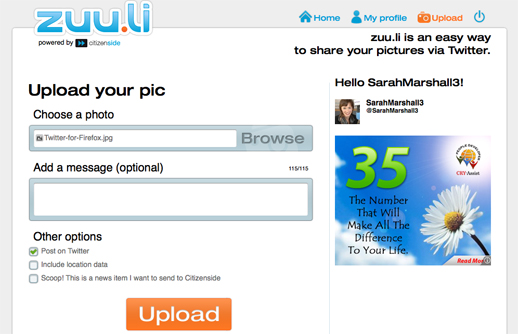Citizen journalism agency Citizenside has launched Zuu.li, a photo sharing service that offers those who take a newsworthy photograph to be paid a minimum of 50 per cent in commission.
“Conventional image-sharing services don’t give photographers a fair deal,” said Citizenside editor-in-chief Philip Trippenbach. “If you take a photo and share it through a conventional sharing site, you could see that picture published around the world, and not get a cent in fees or even a named credit.”
After a citizen photographer (if we can call them that) uploads a photo to Zuu.li and ticks a box saying “scoop”, the Citizenside newsdesk, which is based in Paris, monitors the feed and seeks to license any newsworthy pictures.
Citizenside carries out picture verification to ensure a photograph of an exploding volcano, crashed plane or train on fire is authentic. The agency then tries to sell the photographs on, including to the agency AFP, which it has a relationship with. Trippenbach told Journalism.co.uk they are working on ways to improve the speed and process of verification and hoping to use the community.
The citizen photographer is paid 65 per cent of the money Citizenside sells the picture for if it is published in the same country where the picture was taken; the photographer gets 50 per cent if it appears in a different country.
Philip Trippenbach on Zuu.li by Sarah Marshall
Trippenbach told Journalism.co.uk that Citizenside will “fight to get credits” for photographers so they are named by news outlets publishing their newsworthy photos.
We cannot be responsible for the publishing practices of newspapers or websites that we have no control over. However, credits are very, very important and it is our objective to make sure every picture that is published will have a named credit.
Zuu.li was due to be launched later this year but bosses decided to bring the beta launch forward after Twitpic, a photo sharing service, changed its terms and conditions resulting in some users believing Twitpic could sell on users’ photos without crediting or paying royalties to the person who took the picture. That took place shortly after Twitpic signed a deal with entertainment news agency WENN. Twitpic responded by apologising for any confusion and seeking to limit the damage to its brand by assuring users that the photographer always retains the copyright.
Android and iPhone apps are planned for Zuu.li, which will be launched after version two of Citizenside’s app, which will include a photo request service from editors looking for citizen journalists to provide specific photos.
Zuu.li launched on the same day as Twitter announced its photo sharing service. Trippenbach said it offers something different. “The thing that sets us a side is that we’re dedicated to a community of people who want to share images in a fair way,” he said.
“You take personal pictures and if you share them with your friends and contacts, you should be able to trust that they should stay personal. If you do want to see where they can go, see if they can get published and get paid for them then you should deal with the experts and Citizenside are the experts,” he said.

Pingback: 140Char » 140Char Links 06/06/2011
Pingback: Citizenside crea Zuu.li para promover el trabajo remunerado de los fotógrafos ciudadanos – Periodismo Ciudadano